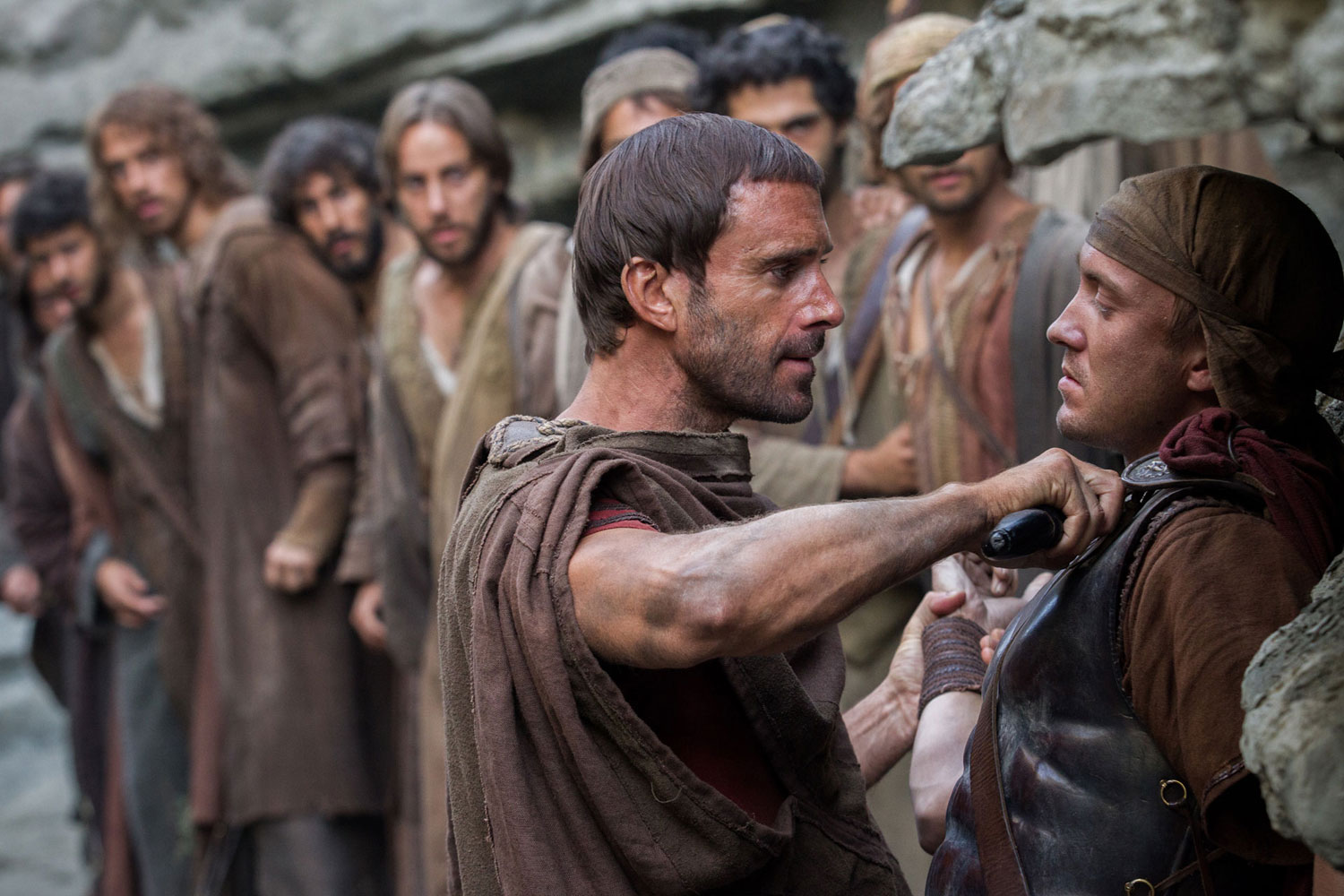RISEN
 Tuesday, February 16, 2016 at 9:13AM
Tuesday, February 16, 2016 at 9:13AM Stars: Joseph Fiennes, Peter Firth, Tom Felton, Cliff Curtis, Maria Botto, Luis Callejo, Antonio Gil, Stephen Hagan, Stewart Scudamore and Joe Manjon.
Writers: Kevin Reynolds and Paul Aiello.
Director: Kevin Reynolds.
Rating: 3/5

For those already imbued with the spirit, Risen will have you praising the heavens…or, at the very least, Sony Pictures, who have jumped on the profitable faith-based film resurgence via their new worldwide acquisitions division, Life Affirm. For secular types, director Kevin Reynolds’s modestly mounted take on the mythology of Easter will play as two distinct halves; an old-Hollywood ‘Roman scandal’ spin on the threat of the prophet to the Empire’s might, that morphs into a dramatically inert ‘greatest hits’ package of the newly reborn Saviour’s miracles.
The central figure is Roman tribune Clavius, a career soldier introduced slaying anti-Roman zealots with a soulless indifference to life. Joseph Fiennes, his eyebrow ridge and leathery visage recalling a young Roy Scheider, delivers a performance that spans ‘brooding intensity’ and ‘distracted nonchalance’; it is one of the lesser Fiennes' better roles, though entirely in line with the production’s mid-level ambitions.
Clavius’ God-of-choice is Mars, so when called upon by Pontius Pilate (a typically theatrical Peter Firth) to see off the latest would-be messiah down in the crucifixion district, he begrudgingly saddles up and heads for the ceremony, his green 2IC Lucius (Tom Felton) by his side. Upon arrival a passionate crowd of followers, wailing for their slain oracle, greets him; Clavius’ interaction with the disciples and encounter with the martyred prophet, Yeshua of Nazareth, are some of the film’s most affecting scenes (though, thankfully, come up well short of the physical horrors depicted in Mel Gibson’s The Passion of The Christ).
Pilate, pressured by Rome to rid the landscape of dissenting voices before a Jerusalem uprising gathers strength, entrusts Clavius with the cave burial of Yeshua. The gravesite entrance is sealed with a boulder wrapped in rope and wax (!) and left in the care of two surly guards (whose broad Brit accents and constant whining veer dangerously close to Monty Python territory). When the tomb is disturbed and Yeshua’s body vanishes, the pressure is on Clavius to hunt down the corpse and bring to justice those responsible. A real-world explanation for the image on The Shroud of Turin represents a key moment of objectivity and brings a degree of balance, at least to this passage of the plot.
Reynolds handles the ‘manhunt’ narrative with a pro’s touch, the journeyman director hoping for his own resurrection after a wilderness period following notorious debacles (Rapa Nui; Waterworld) and box office duds (Tristan & Isolde; Red Dawn). The first half of Risen benefits immeasurably under the experienced filmmaker’s assured touch, the lean drama clipping along at an engaging pace.
But Reynolds’s best efforts can’t provide Risen with much forward momentum after the apparent resurrection of Yeshua. Clavius becomes fixated upon the reborn man, his hardened non-believer status melting away as he witnesses miracles for which Reynolds and neophyte co-scripter Paul Aiello provide no reasonable context or explanation; they just happen, sending Yeshua’s unquestioning, doe-eyed disciples (both on-screen and, one assumes, amongst the target audience) into joyous rapture.
To borrow a line from comedian Greg Proops’ podcast, these scenes constitute the boring, preachy part; the Roman soldier’s transformation from heathen killing machine to breathy advocate of Yeshua’s journey may be the film’s reason for being, but it never rings true. Events told of in Sunday schools the world over are well staged (the bounty of fish provided for his starving followers; the laying of healing hands upon a leper), but they serve no dramatic purpose and exist only to bolster the ‘message’.
Of particular interest is the casting as Yeshua of Cliff Curtis, a respected character actor after a series of ethnically diverse portrayals (African American in Bringing Out the Dead; Iraqi in Three Kings; Latino in Training Day; Colombian in Blow; Indian in A Thousand Words; his native Maori in Whale Rider and breakthrough film, Once Were Warriors). Recent theorising by scholars opines that the alleged time and place in which the scriptures took place suggest Yeshua was likely of ‘middle Eastern’ appearance. Given that the film’s demographic resides in the middle-American bible belt, the portrayal of Christ as anything other than the blonde, bearded archetype favoured for centuries in western art and literature (as will be seen when Ewan McGregor’s take on Jesus in The Last Days in The Desert emerges late in 2016) must be considered risky. Curtis' dark-skinned incarnation represents a welcome gamble-of-sorts in an otherwise conventional, if mostly effective, biblical retelling.
 faith-based,
faith-based,  jesus christ,
jesus christ,  religion,
religion,  resurrection,
resurrection,  risen
risen 
Reader Comments (1)
For God so loved the world that He gave His only begotten Son that Whosiever beliveth in Him shall not perish but have everlasting life. John 3:16.